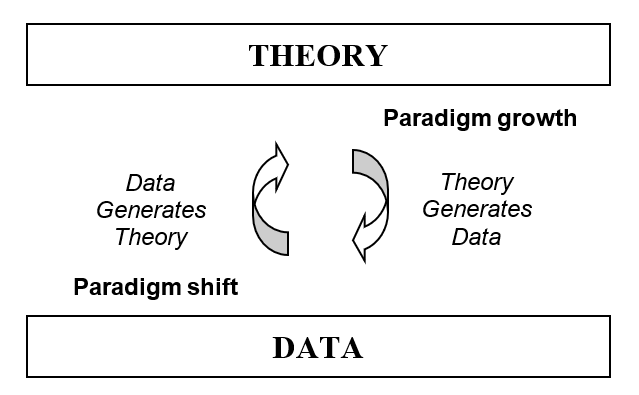When Europeans first visited China, its society made no sense to the colonial mindset, as the constant bowing seemed unnecessary and they didn’t understood the importance of face. Only later was it realized that in China, groups create individuals not the other way round, so being excluded from one’s family, clan, or society was worse than a death sentence, while bowing and keeping face avoided this. Social scientists called the method that led to this discovery grounded theory, which as the name implies, is to first gather data, then theorize about it. Scientists studying new cultures learned to first watch, listen, and record, then form theories to test the next day. Repeating this method daily then produced a grounded theory, based on the data not bias.
Grounded theory avoids colonial bias but seemed at first to reverse normal science, until Kuhn noted that science has always advanced by paradigm shifts (Kuhn, 1970). Testing theory prediction against data is then normal science, that grows a paradigm, and using the data to generate a new theory by a paradigm shift is also science. Science then includes:
1. Paradigm growth: Theory generates data predictions (normal).
2. Paradigm shift: Data generates a new theory (revolutionary).
In paradigm growth, theory generates new data, while in a paradigm shift, data generates new theories (Figure 2.14). Normal science progresses gradually, as sediment builds up a rock, but paradigm shifts change the theory landscape suddenly, as an earthquake does. For example, the paradigm shift from Galen’s theory of miasma to a germ theory of disease was an intellectual earthquake that sunk one theory and raised another. Grounded theory is the scientific method that supports paradigm shifts.
Kuhn further suggested that in the history of science, paradigm shifts are needed when traditional theories stagnate, to raise a new theory from the data ground up. In Figure 2.14, science connects data and theory either way, to generate data from theory, or to generate theory from data. Both ways are science because both connect data and theory to increase understanding.

It follows that physics could be approaching quantum reality as the colonials did China, with a bias. The bias is materialism not colonialism but the problem is the same. Physics sees only particles not waves, but quantum theory is based on waves not particles, so it made quantum waves imaginary, but what if they aren’t? If a paradigm fails to predict year after year, as particle theory has, is the answer more of the same? Throwing ideas at a wall to see what sticks doesn’t work, so it’s time to revisit the data ground, based on grounded physics.
Grounded physics applies grounded theory to physics by looking at the data from a quantum wave perspective, not a matter particle perspective. It aims to explain quantum reality on its own terms not ours. As will be seen, taking off the blinkers of materialism suggests a universe based on waves not particles, that pulsates with energy not emptiness. A grounded theory of physics would then be based on data not bias.